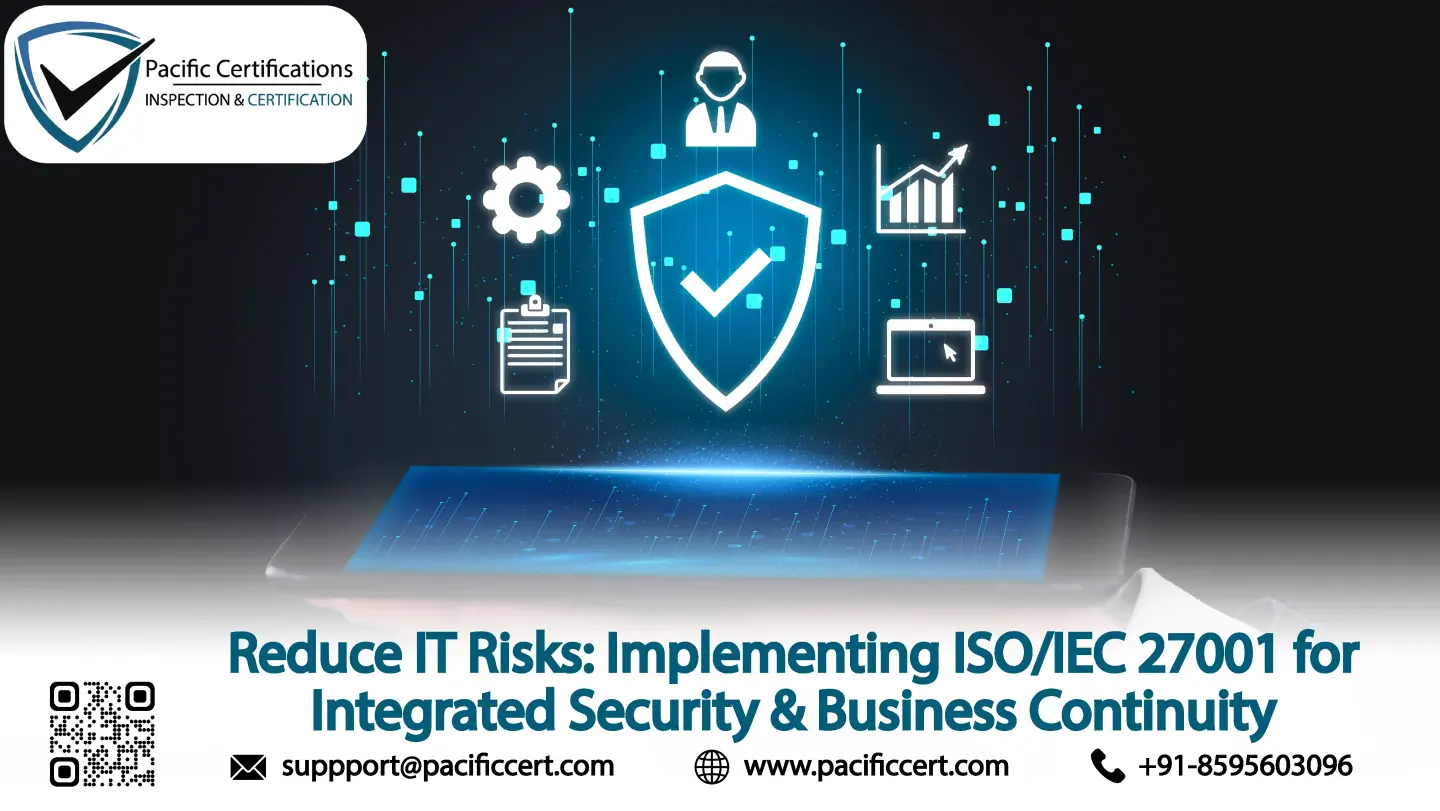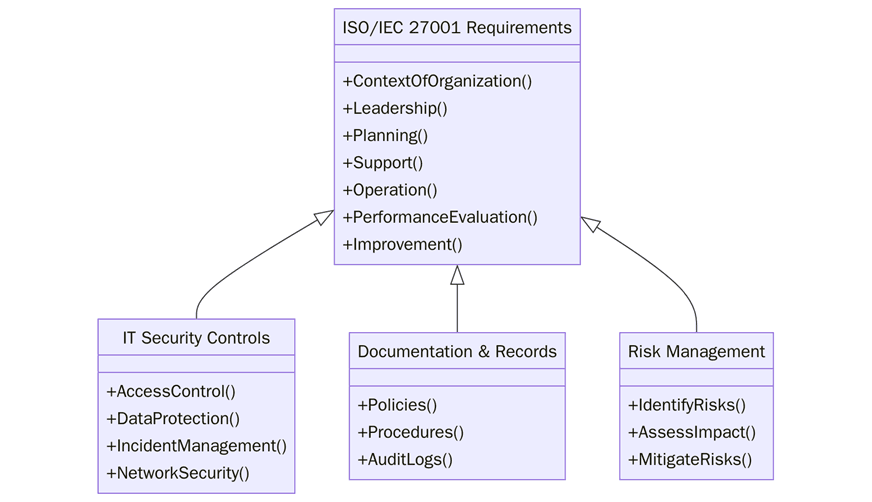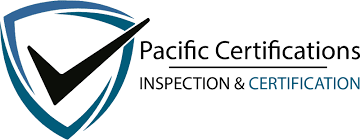Reduce IT Risks: Implementing ISO/IEC 27001 for Integrated Security & Business Continuity

Introduction
Organizations across industries face increasing IT risks, from ransomware attacks and insider threats to system outages that disrupt business continuity. The growing reliance on digital platforms and cloud services means that even a small security breach can lead to operational breakdowns, reputational damage and financial loss. According to IBM’s 2024 Data Breach Report, the average cost of a breach worldwide is $4.45 million, while in sectors like healthcare and finance the figure is even higher. To combat these risks, many organizations are turning to ISO/IEC 27001 certification, which provides a globally recognized framework for implementing an information security management system (ISMS) integrated with business continuity practices.
By embedding ISO/IEC 27001, institutions can strengthen security governance, reduce the probability of costly incidents and improve resilience in the face of unexpected disruptions. The standard ensures that risks are systematically identified, mitigated and monitored, while business continuity processes guarantee that critical functions can continue even during crises.
Start your ISO/IEC 27001 certification journey with Pacific Certifications and safeguard both your IT systems and business continuity.
"ISO/IEC 27001 is not just about preventing breaches, it’s about ensuring that organizations can continue to operate securely and reliably, even when incidents occur"
Quick summary
ISO/IEC 27001 enables organizations to build a structured information security management system that reduces IT risks, protects data and ensures operational continuity. It not only protects against breaches but also aligns with regulations, improves trust with clients and creates long-term resilience through integrated security and continuity planning.
Why ISO/IEC 27001 matters for IT risk and continuity?
Digital transformation has introduced efficiencies but also expanded the attack surface for cybercriminals. Critical data is often spread across cloud platforms, mobile devices and third-party providers, making integrated risk management essential. A 2023 Statista survey found that 70% of organizations experienced at least one IT disruption linked to cybersecurity in the past year.
ISO/IEC 27001 matters because it shifts organizations from reactive to proactive risk management. It sets out structured requirements for policies, audits and evidence, ensuring that IT risks are addressed systematically and that continuity plans are not left to chance. Certification also provides credibility with regulators, partners and customers who expect proof of strong security practices.
Applicable ISO standards for IT security and continuity
Standard | Focus area | Application in organizations | Example evidence | Useful KPIs / SLAs |
Information security management | Risk-based controls for IT systems and data | Risk registers, audit logs | Incident closure time, access review cadence | |
Business continuity | Maintaining operations during IT disruptions | BCP test reports, recovery drills | Recovery time objective, system uptime SLA | |
Privacy information management | Handling personal data securely | Consent logs, privacy notices | DSAR closure SLA, consent withdrawal time | |
Quality management | Linking IT processes with service quality | SOPs, management reviews | Customer complaint resolution, SLA adherence | |
Environmental management | Sustainability in IT infrastructure | Energy audits, GHG records | Data centre energy efficiency %, carbon reduction % |
What are the requirements for ISO/IEC 27001 in IT Sector?
To achieve ISO/IEC 27001 certification, organizations must implement structured processes that integrate IT risk management with business continuity. These requirements ensure security controls are documented, tested and continually improved. Below are the key requirements:

- Define the scope of the ISMS, including IT systems, networks and cloud services.
- Develop information security and business continuity policies.
- Conduct risk assessments to identify vulnerabilities and threats.
- Document evidence such as access controls, audit logs and incident reports.
- Train staff across IT, management and operations on security roles.
- Implement technical and organizational controls, including backups and monitoring.
- Run internal audits and correct nonconformities before certification.
- Review ISMS performance at leadership level, using KPIs for breaches and downtime.
- Establish continual improvement mechanisms for evolving risks.
Tip:Always align ISO/IEC 27001 with ISO 22301 for business continuity. Together, they provide a robust framework to ensure both security and resilience.
How to prepare for ISO/IEC 27001 certification?
Preparation involves aligning IT governance with documented controls and evidence that auditors can verify. Institutions that prepare well minimize disruptions during certification and gain maximum value from the process.
- Conduct a gap analysis against ISO/IEC 27001 requirements.
- Update security and continuity policies to align with regulations.
- Train staff in cyber hygiene, breach reporting and continuity roles.
- Collect and organize evidence such as penetration test results and recovery drills.
- Pilot internal audits to identify compliance gaps.
- Track KPIs like incident response time, uptime SLA and audit closure periods.
- Engage leadership in setting objectives and monitoring outcomes.
Certification audit
Stage 1 audit: Review of ISMS policies, scope and risk assessments.
Stage 2 audit: Evaluation of implementation across IT systems and continuity processes.
Nonconformities: Must be corrected with evidence before certification approval.
Management review: Confirms leadership involvement in security and continuity.
Final certification: Awarded after compliance gaps are resolved.
Surveillance audits: Conducted annually to verify ongoing compliance.
Recertification audits: Required every three years.
What are the benefits of ISO/IEC 27001 certification?
ISO/IEC 27001 certification helps organizations move beyond basic compliance, providing tangible security and continuity advantages. It improves resilience, protects stakeholders and builds trust in an increasingly digital business environment. Below are the key benefits:

- Reduced IT risks through documented, systematic controls.
- Stronger resilience to cyberattacks and service disruptions.
- Streamlined compliance with regulations such as GDPR and HIPAA.
- Faster recovery from incidents through integrated continuity planning.
- Greater trust among clients, investors and partners.
In recent years, organizations are increasingly adopting integrated management systems that combine ISO/IEC 27001 with ISO 22301, ISO/IEC 27701 and ISO 9001. Cyber insurance providers now request ISO/IEC 27001 certification as evidence of risk governance before offering coverage. Regulators are also pushing for verifiable metrics such as breach closure times, SLA adherence and recovery test success rates as part of compliance audits
According to IBM, organizations with mature security frameworks like ISO/IEC 27001 save $1.76 million on average in breach-related costs compared to those without structured systems. Similarly, Deloitte predicts that by 2030, companies integrating ISO/IEC 27001 with ISO 22301 will experience 40% fewer major IT disruptions, proving that certification delivers long-term resilience and competitive advantage.
How Pacific Certifications can help?
Pacific Certifications provides accredited ISO/IEC 27001 certification services for organizations seeking to strengthen IT risk management and business continuity. Our audits confirm alignment with international standards, helping institutions build resilience, protect data and improve stakeholder trust.
Request your ISO audit plan and fee estimate, we will help you map Stage 1 and Stage 2 timelines and evidence requirements for your institution. Contact us at [email protected] or visit www.pacificcert.com.
Ready to get ISO certified?
Contact Pacific Certifications to begin your certification journey today!
Author: Alina Ansari
Suggested Certifications –
Read more: Pacific Blogs

